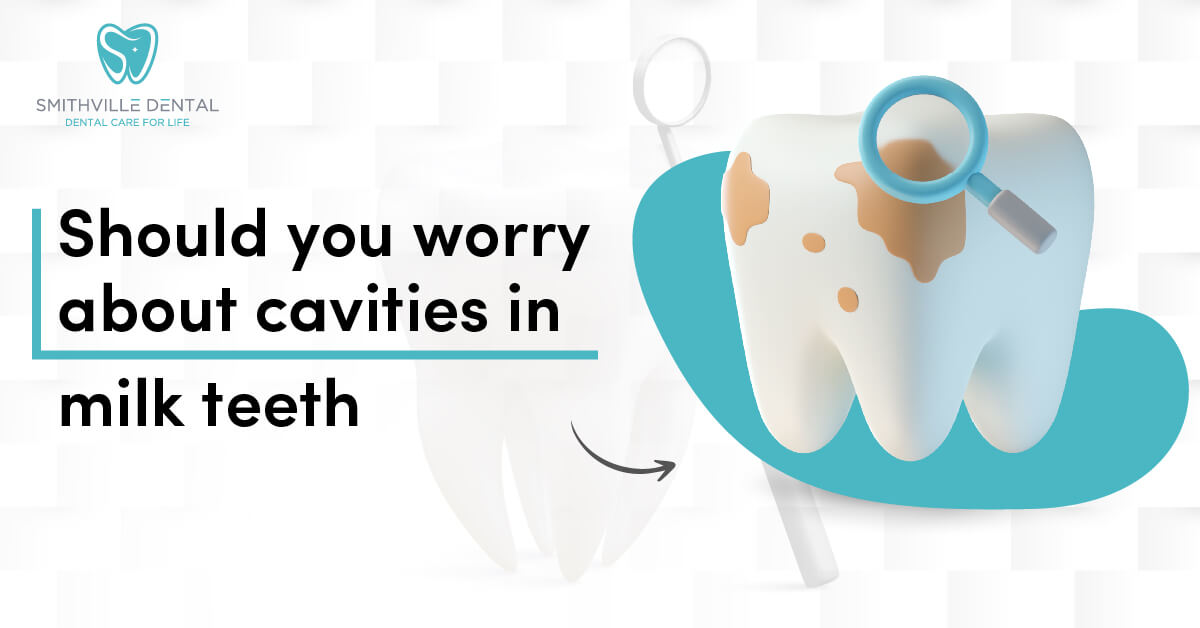It’s simple to assume that a cavity in a child’s baby teeth or milk teeth is of little consequence. The truth is, the adult teeth that will eventually take their place might be impacted by the state of a child’s baby teeth. Cavities and other oral health issues might also affect general health. That’s why when a child’s first tooth begins to erupt, parents should start paying attention to their child’s oral health, particularly cavity prevention.
Why Health Milk Teeth is Crucial?
Baby teeth that are in good health are crucial to a child’s development. A child will have trouble speaking and chewing without them. The effects on growth, nutrition, and general development may be detrimental. Milk teeth also serve as placeholders for the positioning and alignment of permanent teeth.
How Ignoring Cavities in Milk Teeth Can Harm Your Child?
Cavities can affect both baby teeth, especially if proper hygiene is ignored. Baby teeth are susceptible to cavities known as Bottle feed or nursing caries. The infection in milk teeth has the potential to spread far and do a great deal of harm before the teeth inevitably fall out. Early tooth decay in the new tooth might result from an untreated infection that enters the new root and regions below it, thus the permanent tooth that will eventually replace the baby tooth may also be harmed by the infection.
A baby tooth with a cavity may look like a good reason for extraction. Unfortunately, extraction rarely totally resolves the issue. Baby teeth serve as placeholders for permanent teeth, thus removing them before they naturally fall out might cause might alignment or crowding of permanent teeth.
How to find out if your child has cavities?
The first symptom of cavities is as usual pain or discomfort, which toddlers and some children may find difficult to explain. Hints mostly include a loss of appetite or not drinking hot or cold drinks. Parents might not be able to tell the reason or detect caries, and this is what makes seeing a dentist the best course of action to identify and treat a cavity in a primary tooth.
Routine dental exams are crucial to help a child have a healthy oral condition. High rates of nursing caries also make it important that children have their first dental appointment around the time of their first birthday or within six months of the eruption of their first tooth.
What Is the best treatment for cavities of primary teeth?
Just like any tooth, a dental filling is the best treatment for a cavity in primary teeth, which also makes routine dental examination important since dental fillings work best when the cavity is discovered early.
Tooth caries left untreated can leave a child’s mouth full of cavities, and the infection might spread to developing permanent teeth underneath the primary milk teeth.
How To Prevent Cavities In Milk Teeth?
- The ideal prevention tactic is always to maintain the best oral hygiene. Even if the child is a baby, make it a habit to properly clean your child’s mouth with a soft cloth moistened with water every time after they have their milk or juice and any other food. This should be done even before their first teeth appear and should be continued till they can start brushing.
- Never let a baby sleep while drinking milk from a bottle overnight. The sugars in milk and juice will stick to the teeth and cause bottle-feed/nursing cavities. During naps during the night, stick to water.
- Talk to your dentist about dental sealants for your child. Sealants stop bacteria from penetrating and creating cavities.
The most crucial point to remember is to take your infant/child to the dentist twice a year beginning when they are a year old.
Conclusion
Cavities in any stage of life should not be ignored, more so if they happen to be present in a child’s milk teeth. Cavities not only harm primary teeth but also permanent teeth. Early adoption of routine dental examinations will help you prevent many oral and dental problems later. Smithville Dental in Smithville for the best Dental Care and routine examination for your child. Our Dental sealants and Fluoride treatments along with routine examinations will help your child have healthy teeth. Call Smithville Dental in Smithville, TX at 512-237-4420 or visit our website to know more.

 Book Appointment
Book Appointment